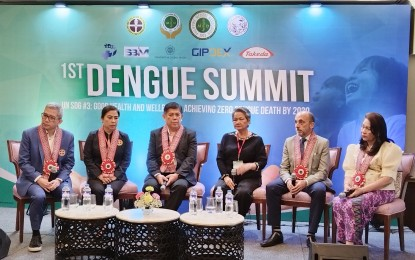Health experts want2nd gen dengue vax ok’d
- Lyn Tallio
- Jun 25, 2024
- 3 min read
Updated: Jun 26, 2024
By: John Genesis A. Damgo
DENGUE SUMMIT. (From left) Philippine College of Physicians (PCP) president Rontgene Solante, PCP past president Imelda Mateo, Philippine Medical Association president Hector Santos Jr., Philippine Pediatric Society president Florentina Uy-Ty, Department of Immunizations Brazilian Society Pediatrics president Renato de Ávila Kfouri, and Philippine Foundation for Vaccination executive director Lulu Bravo form the panel of experts answering questions about dengue and dengue cases prevention during the First Dengue Summit on Tuesday (June 25, 2024) at the Diamond Hotel in Manila City. The health experts agreed that vaccination is important in preventing potential dengue outbreaks in the country. (Photo courtesy of PNA)
As cases of dengue appear to be taking an upsurge nationwide, health experts yesterday called on the Food and Drug Administration (FDA) to approve the second-generation vaccine against the deadly mosquito-borne disease.
This after Philippine Foundation for Vaccination Executive Director Lulu Bravo bared that Takeda, manufacturer of dengue vaccine, QDenga, has already applied for FDA registration in the country and is awaiting for the agency’s approval before distributing the anti-dengue shots.
“That has been applied for since last year and we have been waiting for that. As a vaccine investigator I will assure you the safety of the QDenga. We have been doing it for eight years now since 2016,” she said.
“It can be given to those who have not had dengue which is different from the previous first-generation dengue vaccine in that it was meant to be given only to those who had previous dengue,” she said.
Philippine College of Physicians president and infectious disease expert Rontgene Solante said the approval for the new vaccine warrants immediate attention as he stressed the Philippines has the four serotypes of dengue virus, with children and senior citizens prone to having dengue especially now that effects of climate change are more evident.
“When you get infected by the first serotype, you are not immune for other three serotypes, so, meaning that means you can have dengue again and again,” he said.
He said the country has been practicing vector surveillance, vector management, vector control, patient education, and disease management since the first dengue epidemic surge in 1954.
While these practices have helped reduce possibilities of epidemic, Solante said vaccination could help prevent future problems related with the disease.
“If we give vaccines, there would be less hospitalizations. Let’s remember, the benefit of vaccines is not only protecting you from dengue, it is protecting you against the severe form of dengue so you don’t get hospitalized,” he said.
Philippine Medical Association president Hector Santos Jr. said the rising number of dengue cases serves as a reminder of the urgent need for a unified front in the battle against the disease.
Latest data from the Department of Health show a concerning increase in reported dengue cases compared to the previous year, with 59,267 cases from Jan. 1 to May 4. This figure surpassed the 45,722 cases reported in the same period.
According to the World Health Organization, there are over 7.6 million reported cases of dengue as of April 30, 2024.
Dengue is caused by a virus that Aedes mosquitoes spread to people. Its symptoms include high fever (40°C), severe headache, muscle and joint pains, nausea, rashes, pain behind the eyes, vomiting, and swollen glands.
Some cases develop into severe dengue with symptoms like shock, severe bleeding or severe organ impairment.
“Prevention is most important. We’re on the medical doctor’s involvement to prevent the vector from growing bigger, which is seasonal, usually growing from May to December, we’re planning preparedness and prevention,” Santos said.

Comments